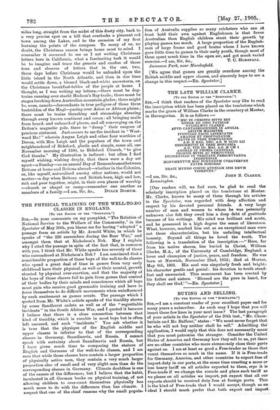THE PHYSICAL TRAINING OF THE WELL-TO-DO CLASSES IN ENGLAND.
(TO THE EDITOR OF THE "SPECTATOR:]
SIR,—In your comments on my pamphlet, "The Relation of National Service to the Welfare of the Community," in the Spectator of May 20th, you blame me for having "adopted" a passage from an article by Mr. Arnold White, in which he speaks of "the 226 surrenders during the Boer War," and amongst them that at Nicholson's Nek. May I explain why I cited the passage in spite of the fact that, in common with you, I think that Mr. White speaks too severely of those who surrendered at Nicholson's Nek ? I am convinced that a considerable proportion of those boys of the well-to-do classes who spend a great deal of time in games from very early childhood have their physical, as well as their mental, growth stunted by physical over-exertion, and that the majority of the boys of those classes fail to gain from games that control of their bodies by their minds and consciences which all boys must gain who receive good gymnastic training and have to force themselves to do difficult movements when uninfluenced by such excitement as games create. The passage which I quoted from Mr. White's article speaks of the timidity shown by some Sandhurst cadets as well as of the "regrettable incidents" in the South African War, and I quoted it because I believe that there is a close connection between that kind of timidity, which is curable in most boys but is often left uncured, and such "incidents." You ask whether it is true that the physique of the English middle and upper classes is inferior to that of the corresponding chases in Germany, Scandinavia, and Russia. I cannot speak with certainty about Scandinavia and Russia, but I have given much time to comparing the stature of English and Germans of the well-to-do classes, and I am sure that while those classes here contain a larger proportion of physically active men, they contain a very much larger proportion also of small and of very slight men than do the corresponding classes in Germany. Climate doubtless is one of the causes of the difference; but I believe that the habit, inculcated in all German books on physical training, of not allowing children to over-exert themselves physically has much more to do with the difference than has climate. I suspect that one of the chief reasons why the small popula-
tion of Australia supplies so many cricketers who can at, least hold their own against Englishmen is that fewer Australian than English children stunt their growth by playing games too much. A large proportion of the English- men of large frame and good brains whom I have known gave little time to games in their early youth, though most of them spent much time in the open air, and got much varied
[We agree that games are greatly overdone among the British middle and upper classes, and sincerely hope to see a change in this respect.—En. Spectator.]






































 Previous page
Previous page